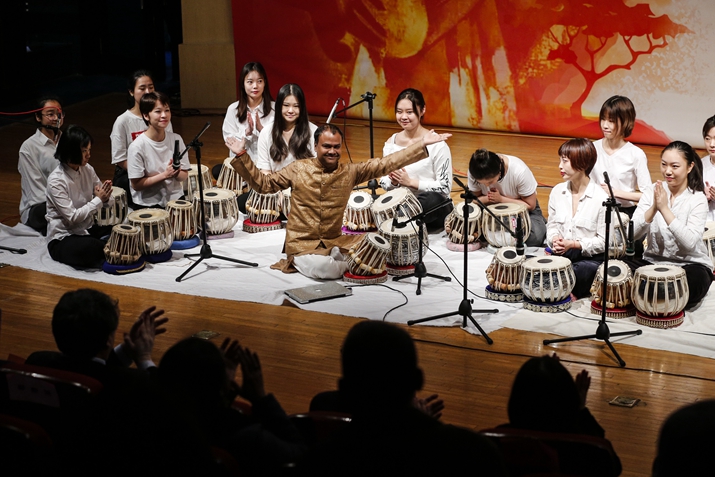Eclectic sound
Using the acronym of "words aren't just enough" as her stage name, Waje, whose vocal range covers three octaves, started her music career in 2007 and in no time got opportunities to perform with popular local and international artists. She has won over 20 awards and nominations worldwide and has become one of Africa's most respected and iconic musicians.
With the 10-track album Red Velvet, she presented her vocal talent to Chinese music fans for the first time. The album's name was inspired by the significance of the color red and the smoothness, royalty and elegance of velvet. "It is focused on relationships—romantic relationship, familial relationships, relationship between friends and the relationship with self. It is strongly rooted in love and conflict," she said.
It is this focus on relationships that draws her closer to China and Chinese listeners. "Asian music has always been distinct and instantly recognizable. I like to think that my sound is exactly like that," she said. In her eyes, the Chinese pop scene is also very strong as it has "found a way to infuse pop without losing its originality." According to Waje, this is in line with her own style.
Drawing inspiration from musical legends such as Aretha Franklin and Whitney Houston, Waje describes her music style as "eclectic," a mix of R&B, Afrobeat and jazz with a huge reliance on horns. She believes that African music in general, and her music in particular, is set to appeal to a range of musical tastes in China and can create new cultural exchange stories.
A message of hope
Cobhams thinks that China is a great place to release his song at this time. "We are about to witness the introduction of a brand new, true, organic and proudly African genre. It will be an eclectic experience for the Chinese market," he said. On the other hand, "as deeply cultural as it is, China has become the melting pot for productive and creative diversity. This makes it a good launch pad to the world," he said.
With his new single Ordinary People, Cobhams wants to convey a message of hope and encourage everyone to play a part in making the world better. "You don't need to be a superstar because ordinary people make a difference every day," he said.
Indeed, visual impairment didn't prevent him from making a difference in the Nigerian music industry, but instead it became "a gift." Before bringing his music to Asia, the 39-year-old singer, songwriter and music producer had earned tremendous success in Africa, Americas and Europe. He is especially known for producing some of the finest artists and music TV shows in Nigeria and has won several local and international awards for his creative and entrepreneurial contributions.
"I believe that sight is a good thing but we are constantly being inundated by visual images that distract us more than they help us move forward," Cobhams said. "To a large extent, I am able to escape that. As a result, I can focus on the things that matter more to me. I also have no shame or fear of failure because when you start out as I did, you have more to gain than to lose."
Cultural ambassadors
Currently, more and more young Chinese people are becoming fond of African music, which Waje and Cobhams said has a magic power.
"Like Chinese music, African music is very rhythmic—each instrument tells its own story, makes you a part of it and takes you on a different journey. It's also very rich and bold. Music is universal. You don't even need to know the words to connect to the music and mood of the musician," Waje said.
For Cobhams, the strength of African music lies in its originality as well as the portrayal of a rich culture. "African music is currently a window to the African cultural experience," he said.
That is also the reason why he hopes his music would turn him into an ambassador of a rich culture and heritage. He expects that as his music gains acceptance, he can immerse himself in the equally rich culture of China and share his experience with people back home. "I also look forward to opening opportunities for collaborations as a means to expose the people of my country to Chinese culture," he added.
Waje also wants to play an active role in promoting the mutual understanding between African and Chinese people. "My music will expose Chinese people to our shared feelings, and as they get to know me, they will love me and my people—the people of Africa."
(Printed Edition Title: Music of Solidarity)















